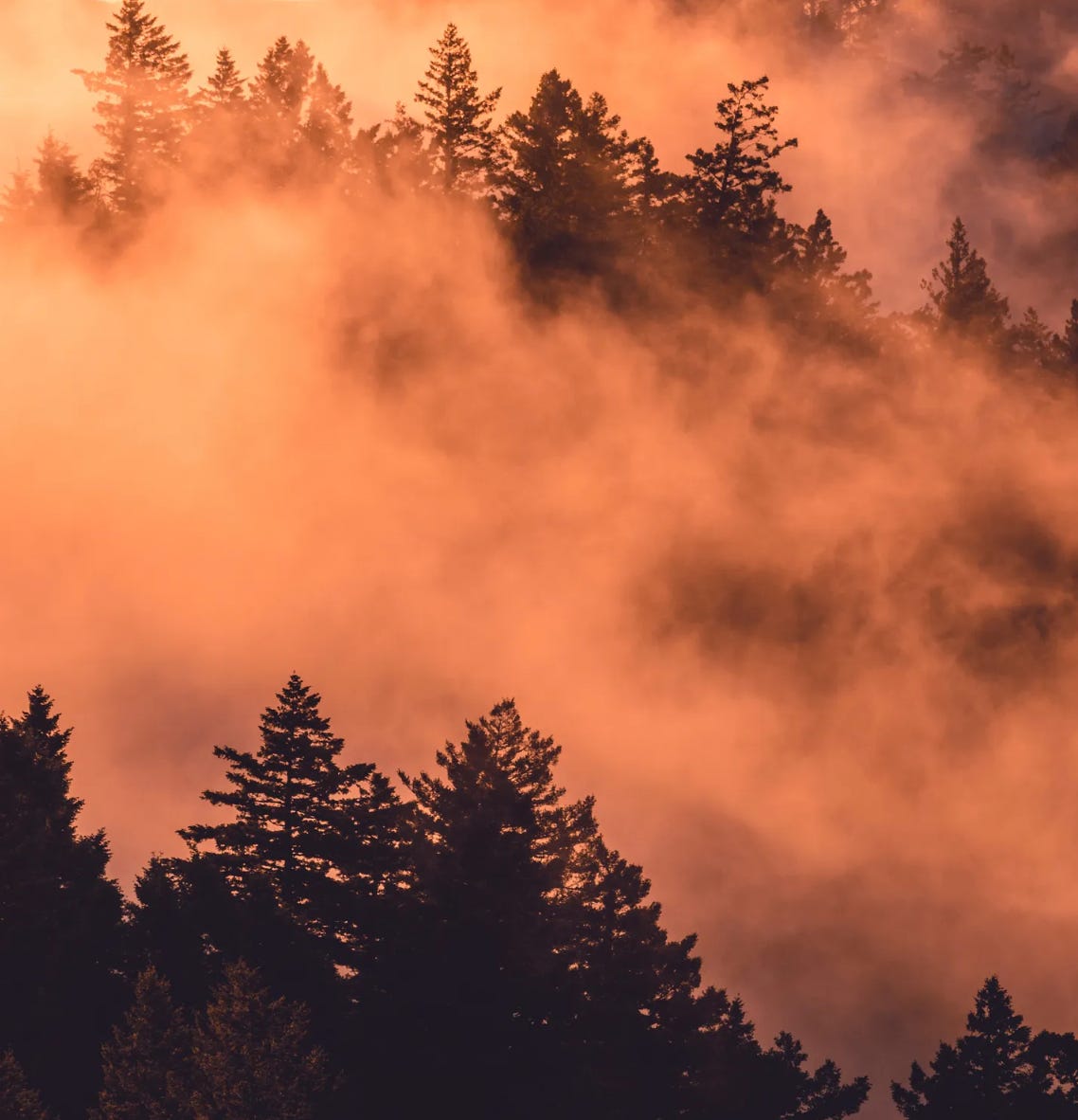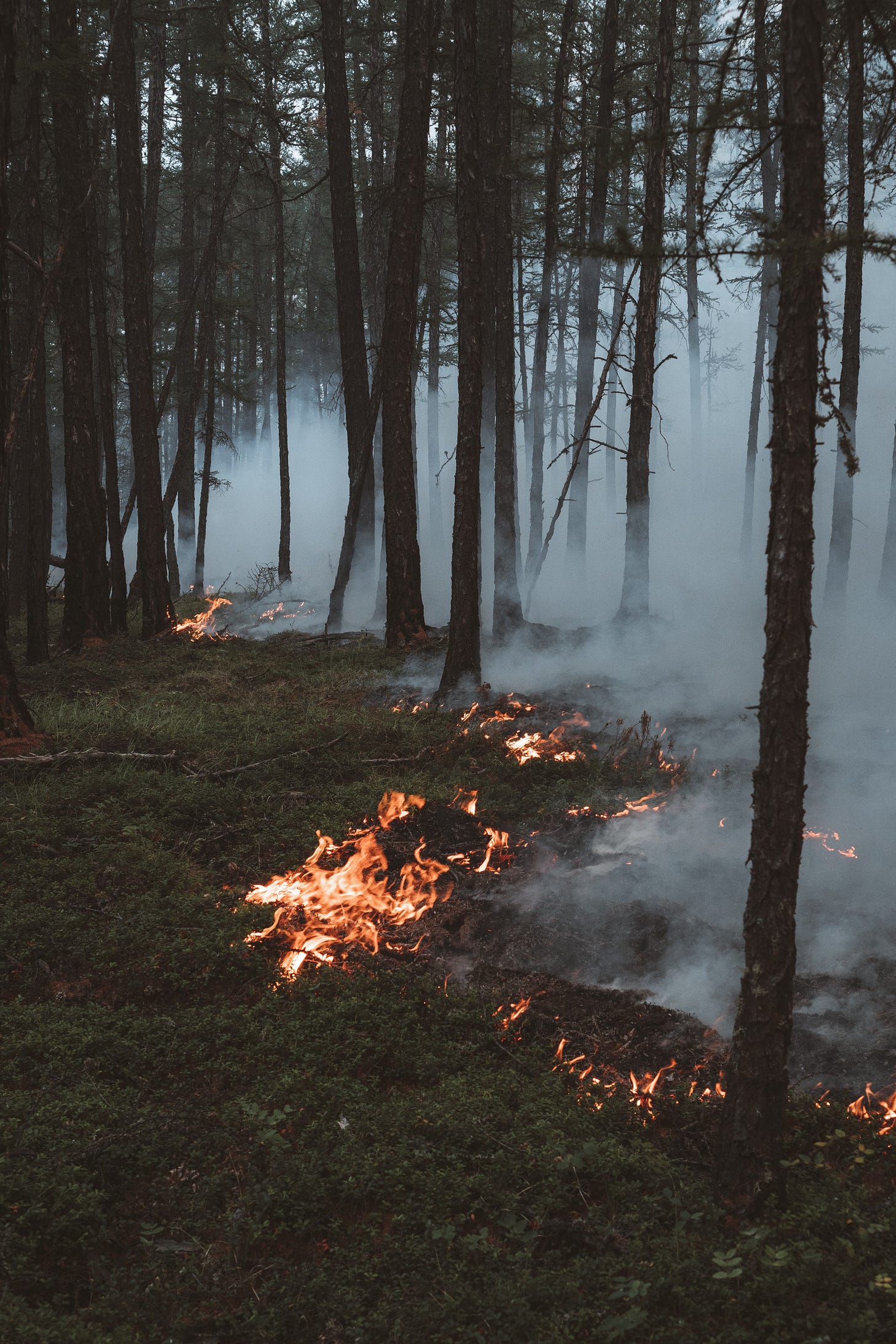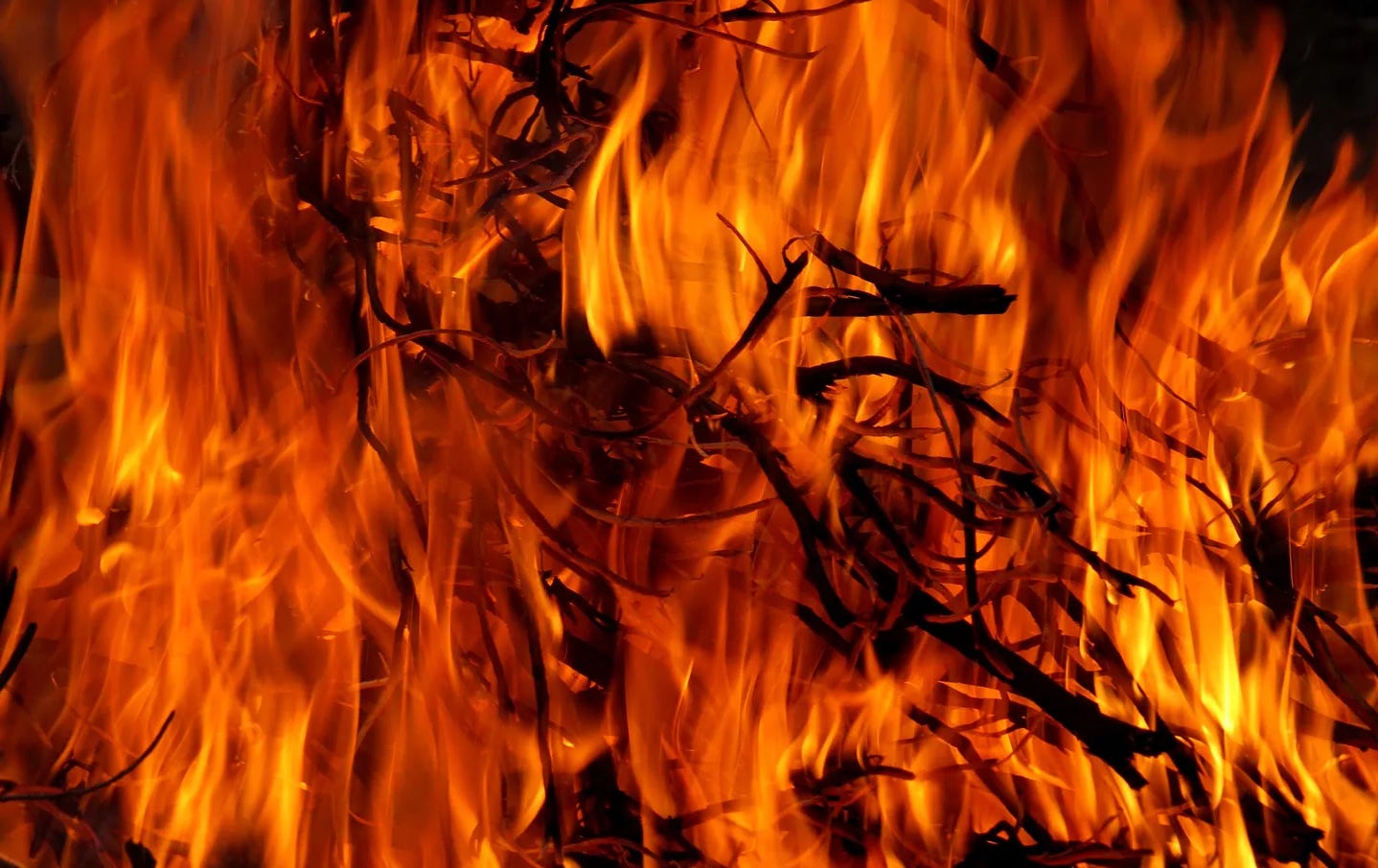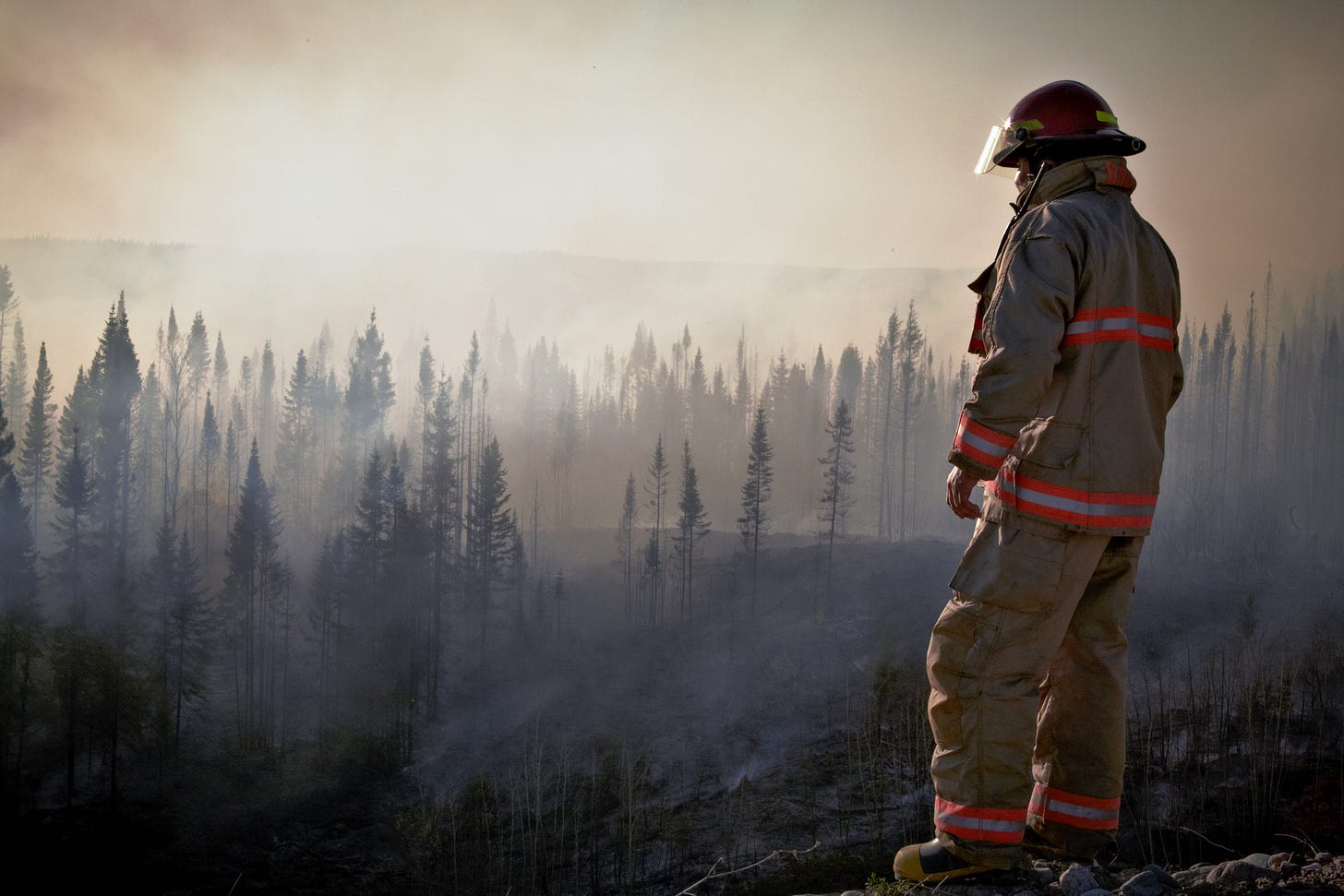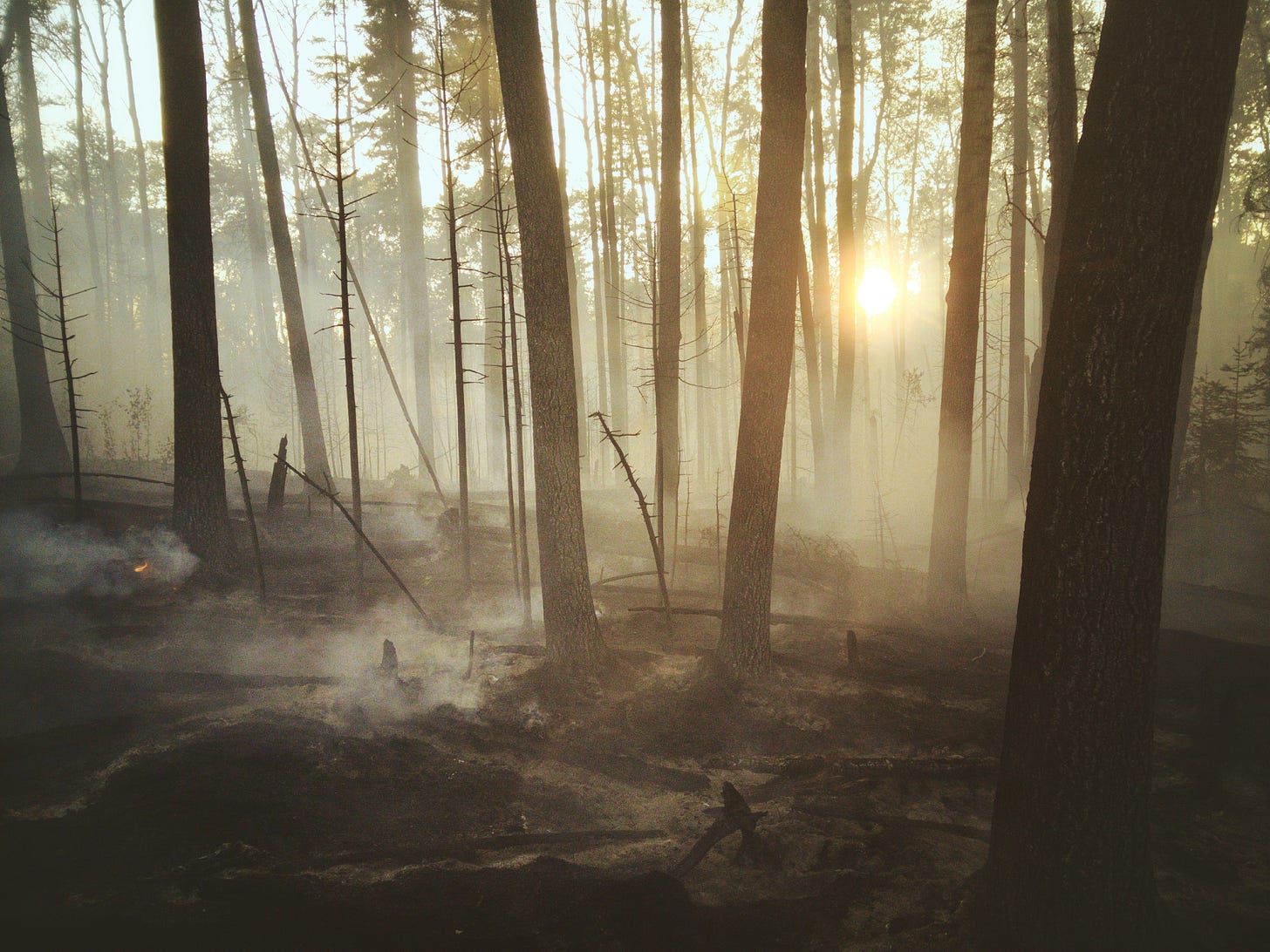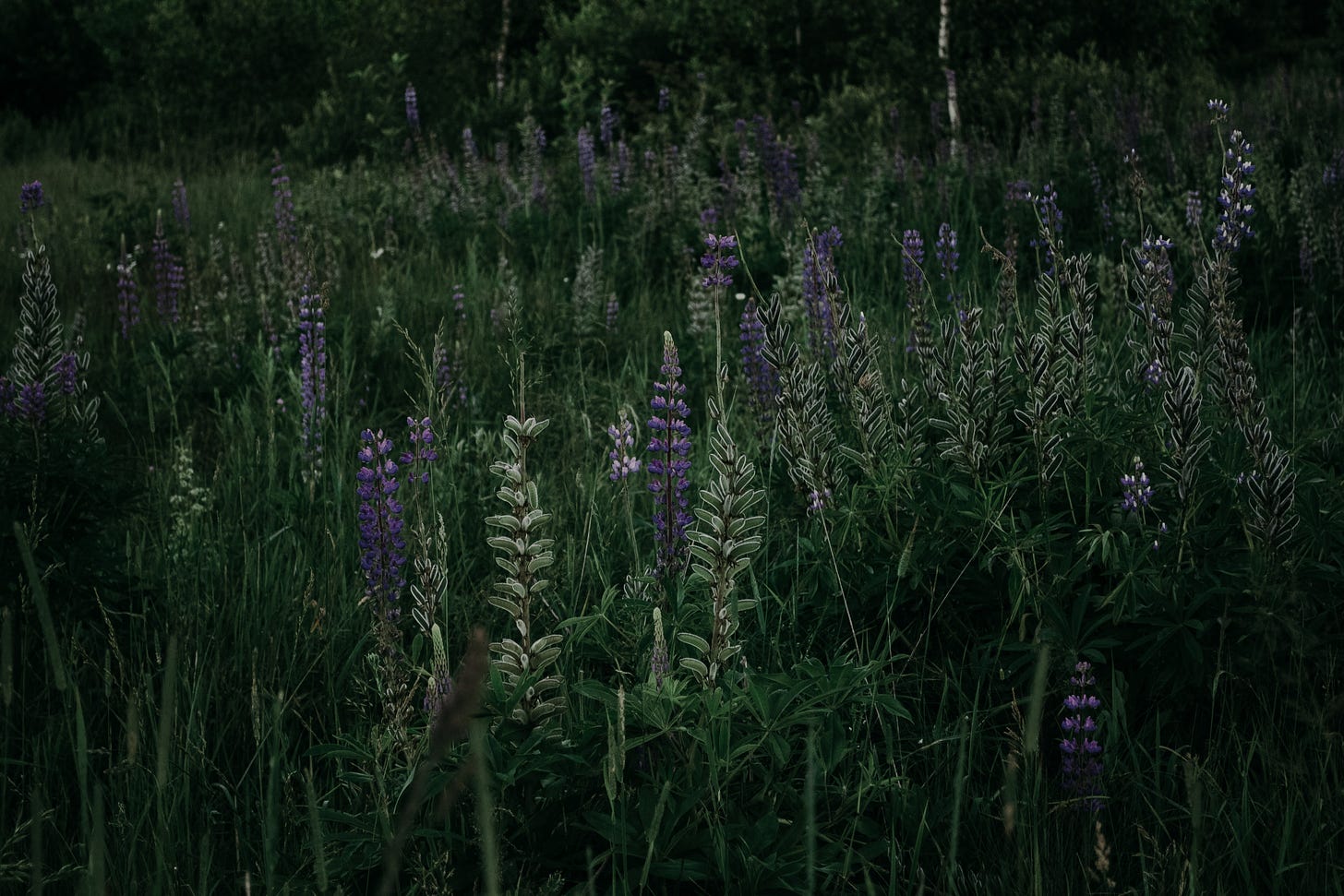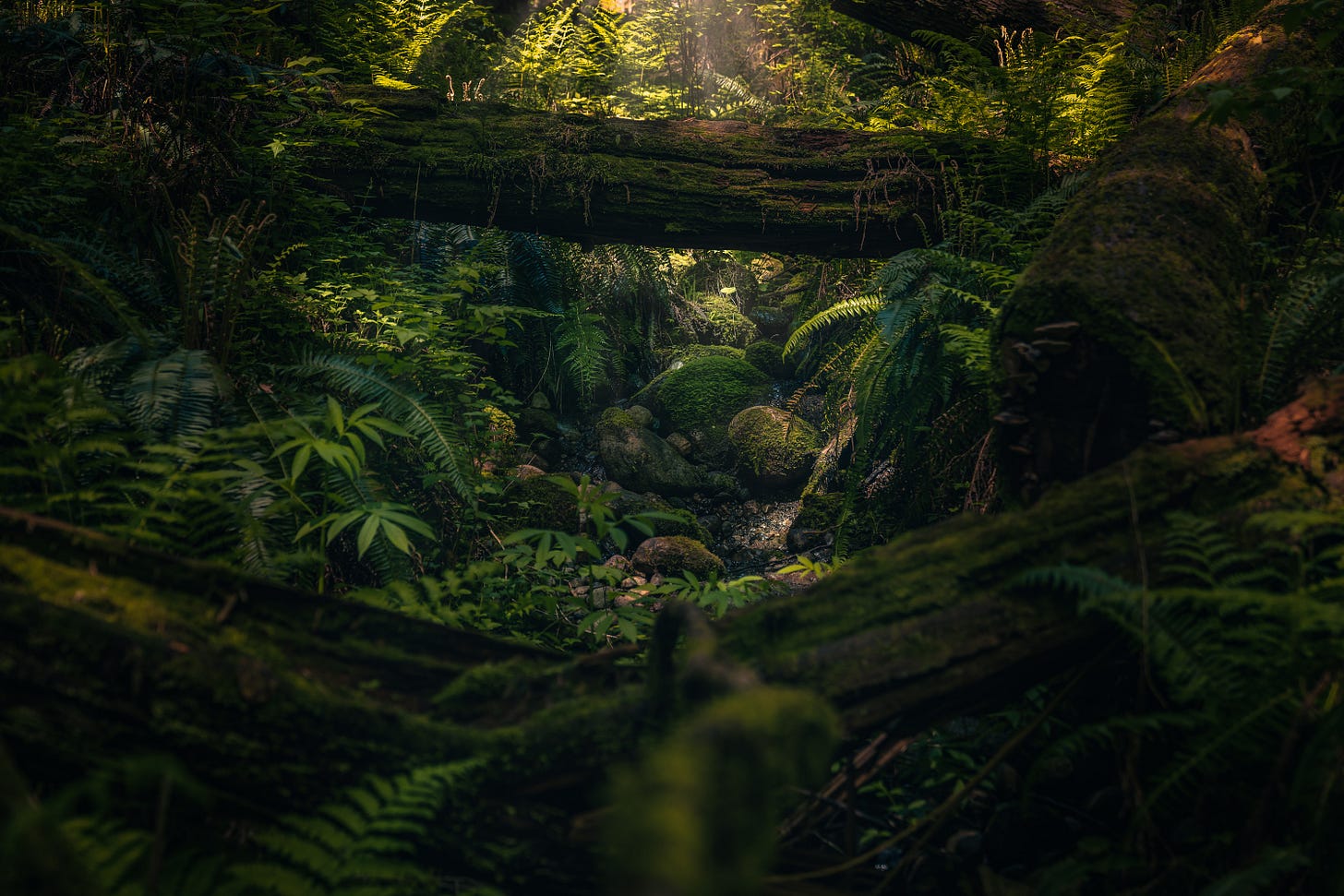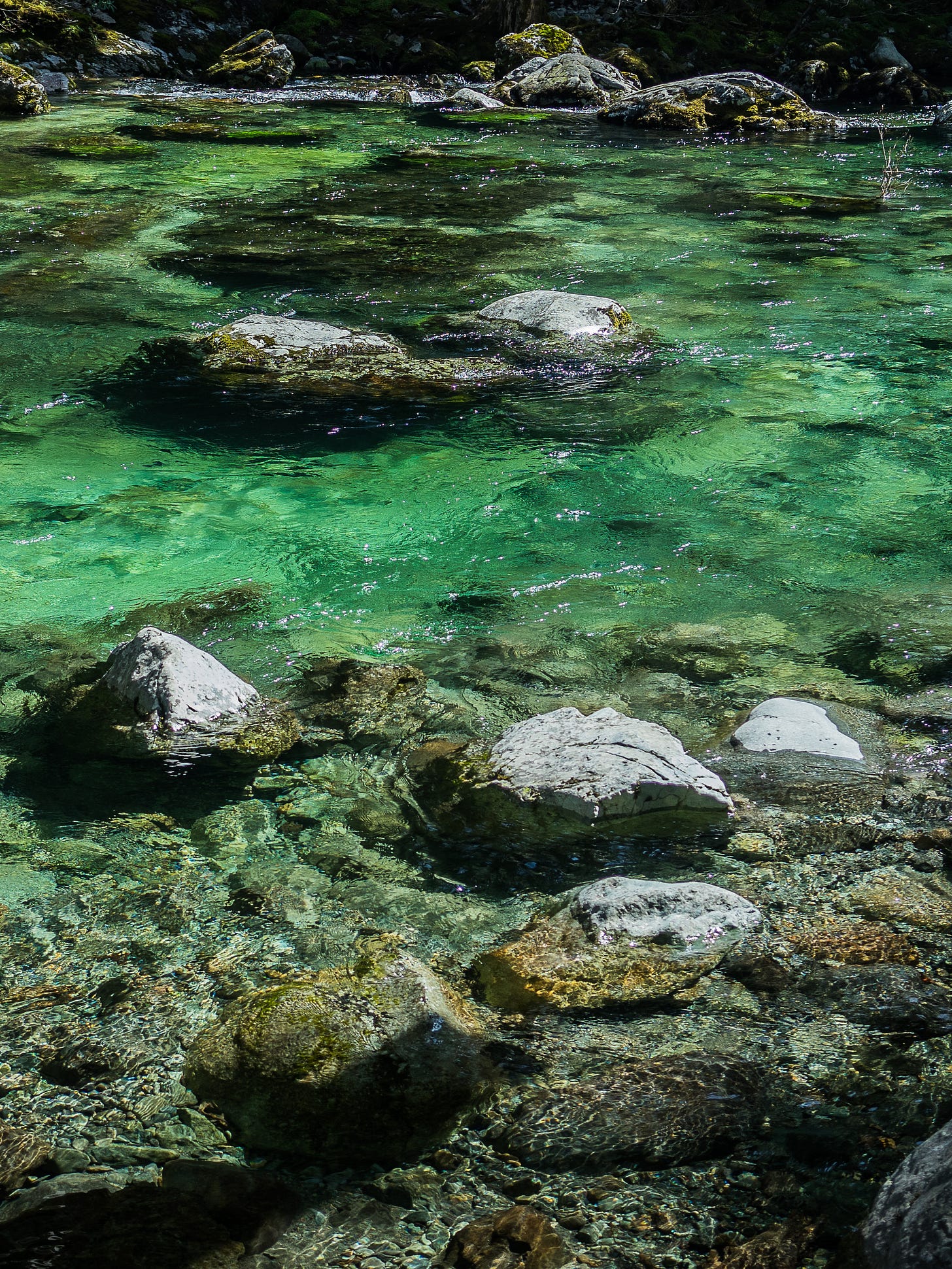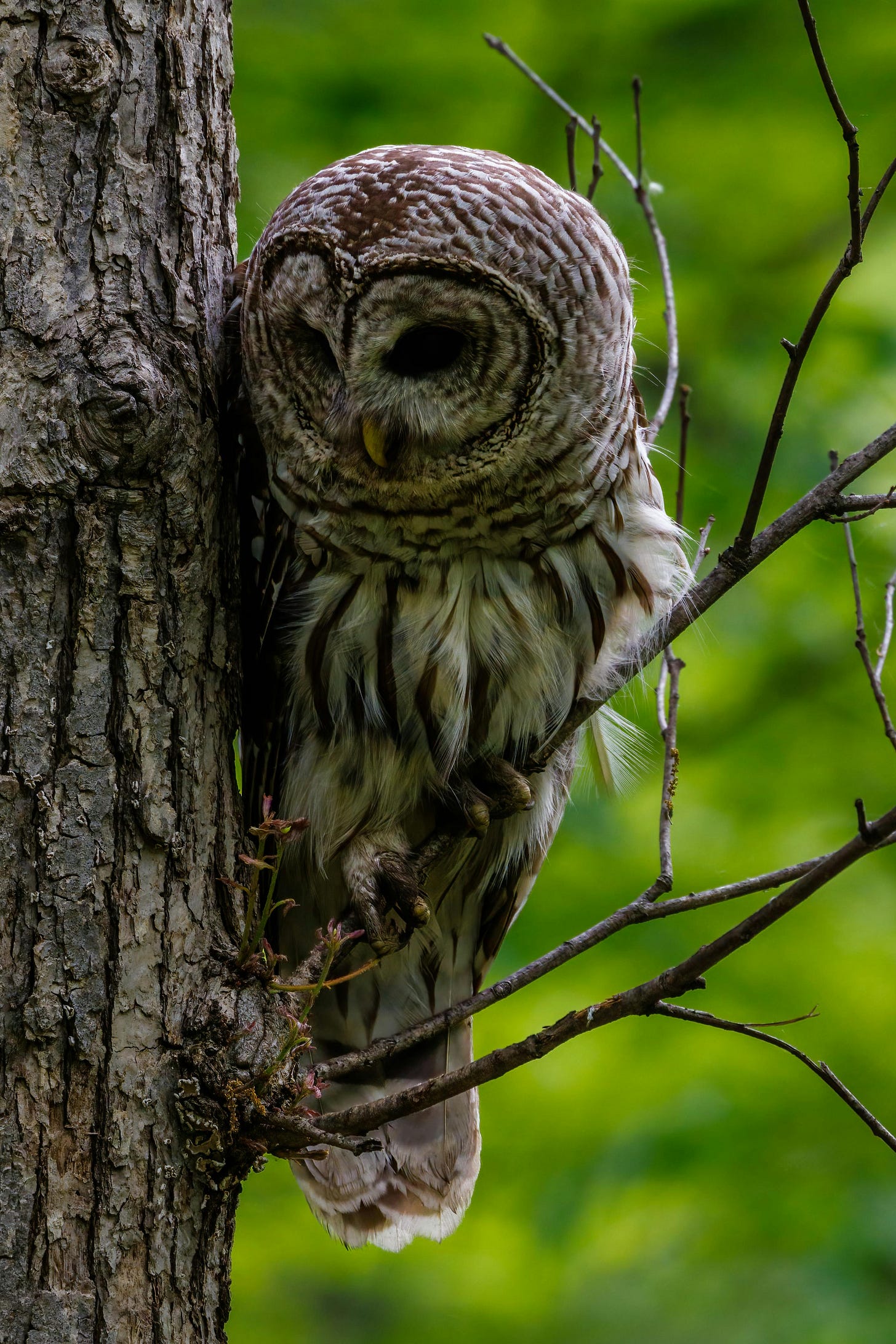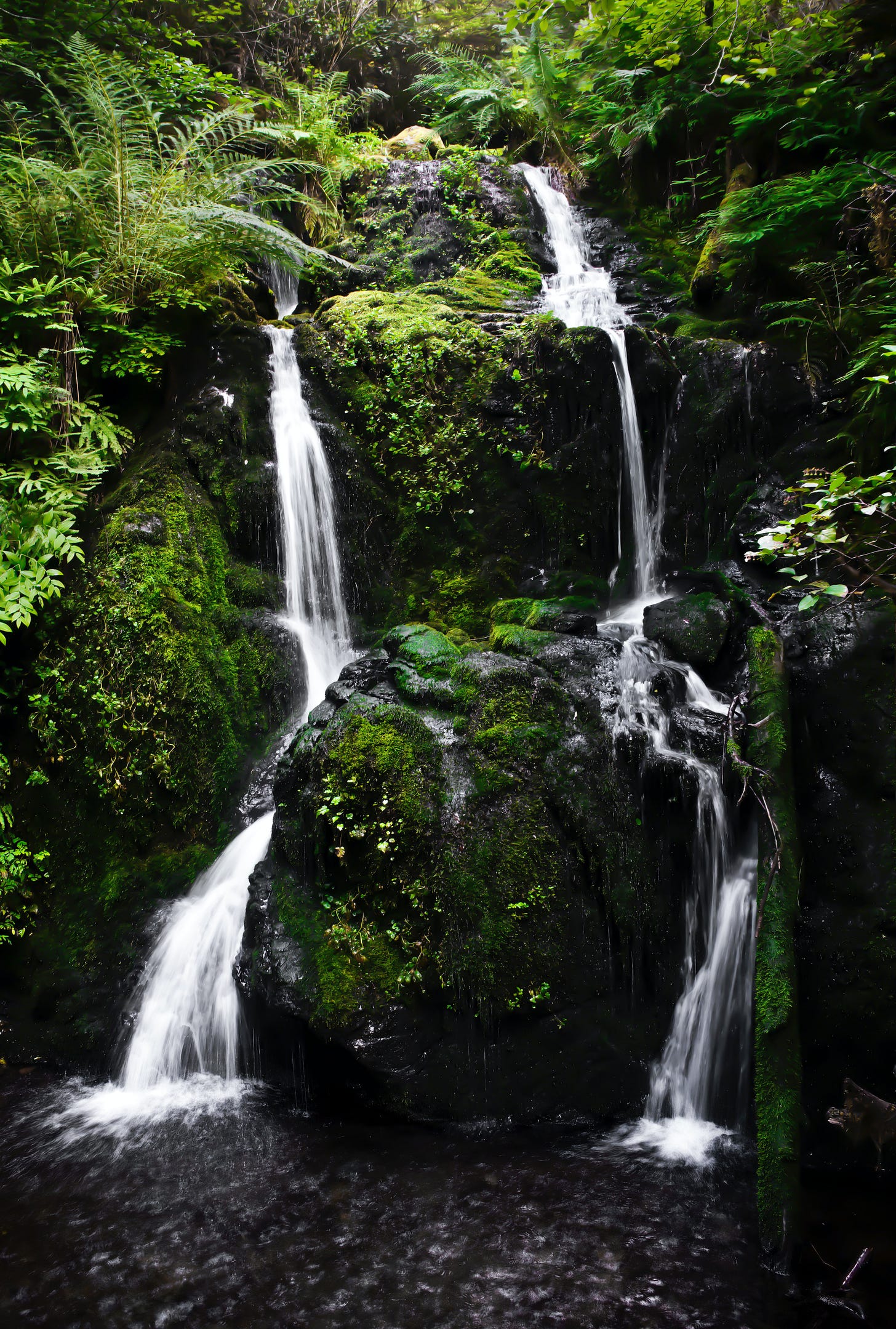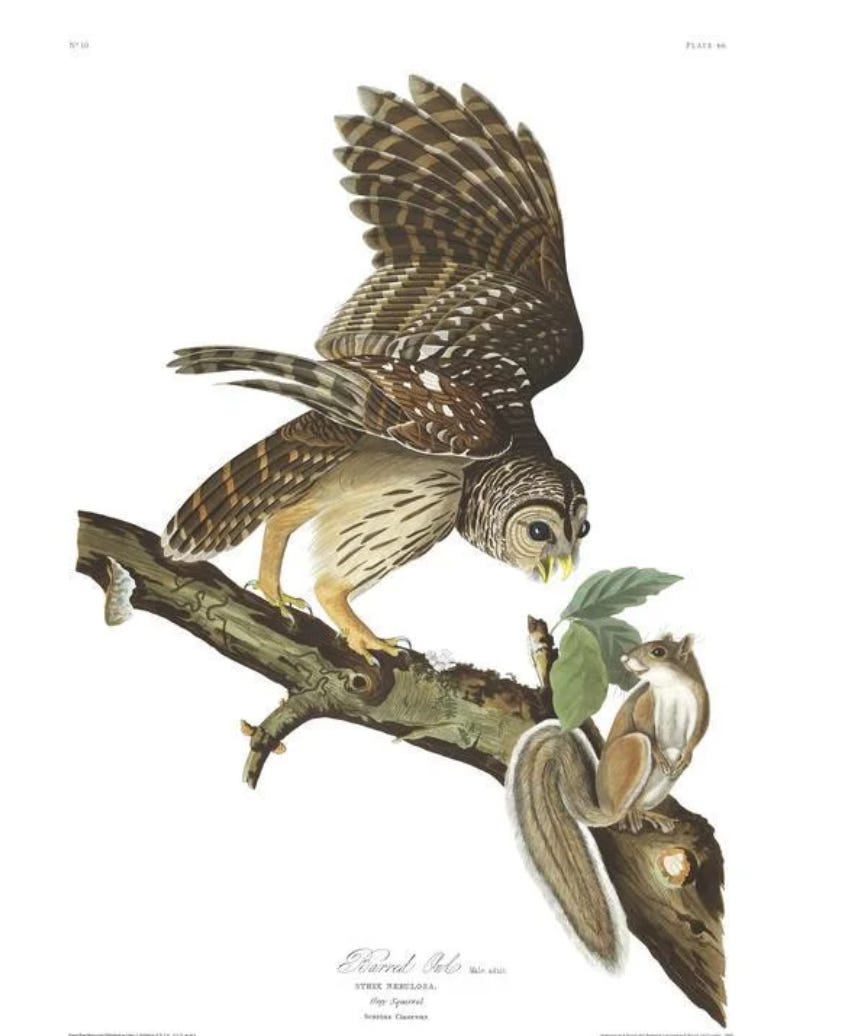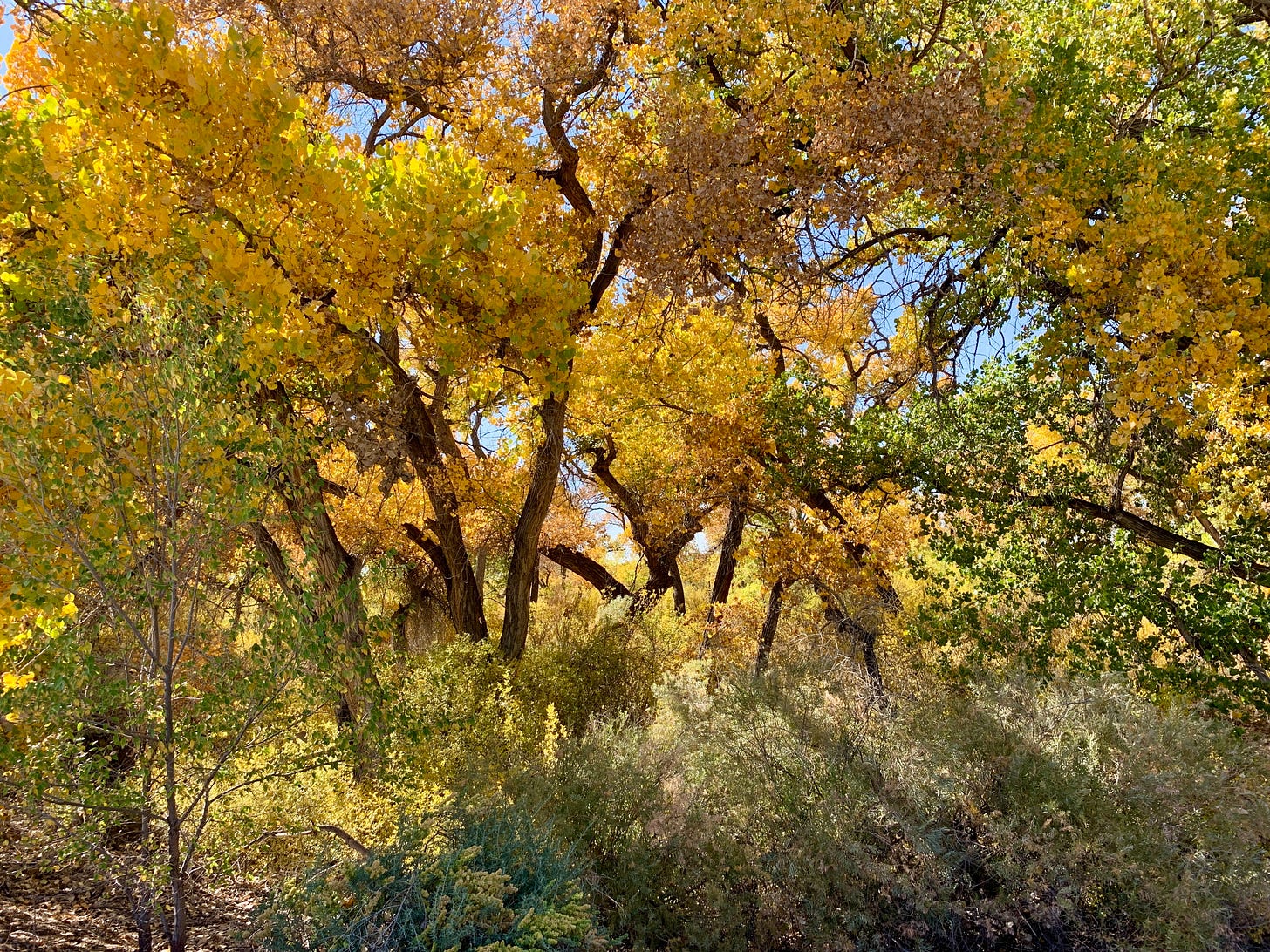CHAPTER 24: Cottonwood
Scout lay in the kitchen corner while Grace and Jackson washed the breakfast dishes, lost in their thoughts. Scout looked up when Jackson’s cellphone vibrated.
“Jackson,” said Frank, slightly out of breath, “another fire! Shannon’s Peak, Fire Road 35, Mile Seven.”
“Leaving in five,” said Jackson, ending the call. “We’ve got a fire,” he said to Grace as he headed to the mudroom to change into his fire-fighting gear. He galloped to the garage and found Grace waiting for him. “Do you have an invite?” he asked as he opened the garage and unlocked his truck. She climbed into the cab and pursed her lips. “I’m not about to miss my first, and probably my only, real forest fire.”
“Well, I’d love to miss one,” he said, as he drove down the driveway.
He looked worried—more than she’d noticed before. “It’ll be ok?” she asked.
“Can’t say. Fire’s unpredictable,” he said. “Shannon’s Peak is fed land, a hundred years of fire suppression, full of fuel. If it turns into a crown fire, burning tree tops, it’ll spread fast. Might get rain, so the Chief might let some areas burn. We’ll watch for wind. No sense letting things get out of hand—there’s a campground, hiking trails twenty miles east.”
A raccoon scampered across the road.
“Fires used to burn about 20 to 50 million acres of American forest lands every year, right?” asked Grace. “Fire ecology?”
“Yeah,” he said, “but after big ones took out whole towns, we had Smokey Bear. Big success. With early detection and suppression, fire took only about 7 million acres annually, too low. Of course, deep ecologists prefer nature to burn it than allow man to use logging and fire to create defensible spaces.”
Jackson turned onto a fire road and they spent 20 bumpy minutes listening to voices on the radio, dodging deer and elk bolting across the road. Over a ridge, the sky glowed eerily.
They reached a hilltop where Jackson parked the truck and jumped out while Grace climbed out slowly, mesmerized by the sight. “Shit,” said Jackson.
The mountainside was glowing cinders and another area billowed thick black smoke. Off to the northeast, a gust of wind whipped the flames. Fueled by oxygen, pillars of fire flared up the sides of trees, exploding them like giant firecrackers, throwing off sparks hundreds of feet into the air.
Grace pulled her binoculars from her backpack. To the southeast, she watched crews setting backfires in advance of the main blaze in order to starve it of fuel. On the ground, Doug fir and Hemlock needles turned black and crinkled up, small shrubs were incinerated, but the thick-barked trees were impervious to the light burn as it moved quickly beneath them.
Grace noticed a black Suburban parked alone at the western edge of the burn. Something hung from its rear-view mirror. Is that Mickey friggin’ Mouse? she thought, focusing in with her binoculars. Coincidence?
“Jackson, can we go over there?” she asked, pointing.
Jackson lowered his binoculars, looked at her, puzzled. “Not my job,” he said, pointing east. “I need to join them.”
“I need to check out that black SUV,” she said. “It could be important.”
“Get in,” he said. As Jackson drove east, he contacted Nate on the CB. “Jack, what’s up?” asked Nate’s voice. Jackson handed the microphone to Grace.
“Nate, this is Grace Newman. There’s a black Suburban parked to the west. If there’s an air freshener hanging from the rear-view mirror—a Mickey Mouse air freshener—I need the license plate. If the driver is a male, thirties, tall, fading red hair cut short on the sides, watch him, follow him. He might have something to do with this fire.”
Jackson raised an eyebrow, kept on driving. Nate finally asked, “Jack, did she say Mickey Mouse? We’re kinda busy. Wind here is a tricky bitch. Out.”
Grace put the microphone back. Jackson shook his head. “Mickey Mouse?” he asked.
“I do have an explanation.”
“Later,” he said. They’d arrived at the main staging area where the Fire Chief was directing his Captains. Grace spotted Mad Max and Big Lou and others she knew.
A man got out of a pickup with a Masters Logging sign on the side and talked to one of the Captains. His crew waited—seven in the truck bed, four in the cab. One in the cab waved Big Lou over for a brief discussion.
Nearby, two women stood by a box truck. “Grace,” said Jackson, “you stay with these ladies.”
“OK, Jackson, Lou, guys,” said a Captain, “we’ve got four pumpers and four water tenders. We’ll flank south and southeast.” He pointed out the areas he’d chosen, outlined his containment plan.
“Yes, Captain,” said Jackson, taking off to join his crew.
“Grace Newman, L.A. Tribune. I know you’re busy but—”
“Later,” the Captain yelled over his shoulder as he walked away. “And keep out of the way!”
Grace ran after Jackson. His crew was piling into his truck. She hopped into the cab next to Big Lou. “Where the hell do you think you’re going?” Jackson asked.
“Jackson’s right,” said Big Lou. “Stay here, where it’s safe.”
“I’m with you,” she said. “We can argue, but I am not getting out of this truck.” Big Lou smiled. She smiled back.
Jackson glowered and peeled out, tires sending gravel flying as they flew by the Masters Logging truck where the crew was engaged in an animated argument with their boss. “What’s that all about, you think?” asked Mad Max in the back seat of Jackson’s cab.
“They asked what we were getting paid and I told ’em,” said Big Lou. “They’re getting a third of that.”
“Shiiit,” drawled Mad Max.
“Strike?” asked one of the loggers.
“Might not last long,” said Mad Max. “Threaten ’em with a long walk home, no place to stay, and they’ll back down. Lou, where they from?”
“Oaxaca” said Big Lou. “A few from Chiapas. Two from Guatemala, pair from Haiti.”
“Haiti? That’s a journey,” said Mad Max. “They got papers?”
“Unlikely,” said Big Lou. “Report ’em to ICE?”
“Immigration? Absolutely, but doubtful they’ll do anything,” mumbled Mad Max and the group went silent.
“I told ’em,” said Big Lou, quietly, “if they need it, we can give ’em a ride and bunks. Right, Jackson?”
“Can be arranged,” said Jackson, keeping his eyes on the road.
A few minutes later, they arrived at their destination and jumped out, grabbed equipment. Ginnie called out from behind a large truck. “Grace! Over here! You stay with us.”
Jackson looked at Grace sternly, growled, “Do it!”
Grace backed down. Ginnie smiled as Grace joined them. “We’re setting up the water and aid station. This is Diane Pryme,” she said. “Follow her lead.”
There were two hot shot crews keeping ten feet, a “dime”, between them as they cleared brush. Some acted as lookouts, others worked ahead scouting line placement or supervising along the line.
Chainsaws roared and small bulldozers moved the heavy stuff, creating firebreaks. The crews used an assortment of tools including shovels and McLeods, Chingaderas, Pulaskis, and monkey paws—small brooms for cleaning up the back of the line.
To the southeast, thunder crashed and lightning lit up the sky.
“Come this way, baby,” muttered Big Lou as he chainsawed through a dead tree. He and Mad Max lifted it and tossed it down a ravine like it was a game of pick-up sticks.
Embers and ash filled the air and the crew’s sweat pasted the black soot to their faces and necks. The firebreak grew wider as they made progress against time and wind. The Fire Chief radioed over, ordered the larger equipment and most of the trucks out of the area. He relayed the coordinates of the next spot to be worked and the crews chose access roads. Men with the hand tools stayed until the fire was almost on top of them before they moved out. They threw their tools into the bed of pickups and jumped in, chests heaving from lack of oxygen and intense heat.
Grace found herself wedged between Jackson and Big Lou in the cab, with Mad Max, Quiet Parker and another big man crammed in the back, several more in the bed. The men panted and hacked as they spat soot and dirt from their aching lungs. They passed around water bottles. No one spoke until they got their breath back, a full ten minutes. Jackson stopped the truck and the men groaned. This break was in worse shape than the last.
“That’s Craig Braverman’s house,” said one, pointing to a small wooden dwelling surrounded by tall trees. “You’d think he’d at least clear a perimeter.”
“Too precious,” said Big Lou. “Shit. He’s got an asphalt roof!”
“His grandfather would be ashamed of him! Fuck him, let it burn,” hissed Mad Max.
“Might want to, but can’t,” said Jackson as the loggers spaced themselves and began clearing the stubborn brush. They barely looked up when Nate and his crew joined them.
“Maybe he’ll send us a thank you note,” said Nate. “Buy us a round?”
The men laughed. “Unlikely,” said Quiet Parker. “Braverman’s such a jerk,” said another.
On and on, the crews worked. Then moved. Then worked again. Grace ran water support, and helped care for fire fighters felled by smoke inhalation and exhaustion. The acrid smoke-filled air swirled around them and Grace’s lungs ached from inhaling the thick, pungent ash.
“Snag!” someone yelled.
Loggers ran to avoid a flaming snag as it fell from a tall tree. Grace’s heart jumped as a burning piece hit one logger squarely on his shoulder and rolled down his back, leaving a trail of flames. He fell to the ground and rolled in the dirt. Once the fire was out, they cut off his shirt and took a look—his back was burned in two places. He was shaking and shivering, was quickly treated and dispatched to the hospital.
Muscles ached and tempers flared when a firebreak didn’t hold and the workers got pushed back to another ridge. Craig Braverman’s house was saved but only after smoke inhalation sent two more men and one woman to the hospital.
The air was warm as a Santa Ana day in Los Angeles, but was humid and heavy. Grace worked in her T-shirt and jeans; her hair plastered to her head with sweat and dirt, her skin streaked with soot and perspiration.
The wind paused and it started to rain. Gently at first, then harder. The smoke changed from black to white as the rain quenched the fire’s appetite. Exhausted fire fighters prayed for nature to save them some effort, but this was still a worrisome moment. This unexpected shift in wind direction and speed, this drastic swing in the weather, could bring the possibility of erratic winds resulting in extreme fire behavior, delivering a Tragedy Fire—a fire with loss of life. Tragedy Fires share four common denominators:
On relatively small fires or deceptively quiet areas of large fires,
In relatively light fuels—such as grass, herbs, and light brush,
When there is an unexpected shift in wind direction or in wind speed, and/or,
When fire responds to topographic conditions and runs uphill.
They were all aware of these dangers and so they prayed, cautiously. Finally, the operation was declared over for the bulk of the crews. The professionals would stay longer, mopping up. Grace and the ladies handed out water and tidied up the box truck.
Some of the men peeled off their filthy shirts, let the rain wash over them then pulled on clean T-shirts.
“Did you see that big spruce explode? Whoa!” said a young man to nods.
“Not as bad as the last burn, but bad enough,” said Mad Max.
“I called the hospital. Everyone’s in good shape,” said Ginnie.
“Good job, guys,” said Nate.
Too weary to cheer, the men walked in slow motion to their trucks, giving each other tired pats on the back. Jackson surveyed the scene before him, shook his head and joined his friends.
<><><><>
Radios crackled in the background, the remaining crew worked hot spots. But overall, the sense of panic, of racing against time and flames, the need to confront unknown threats, had all subsided, as quickly as it had built.
Grace climbed a hill and studied the burn area—acres reduced to glowing embers, neon red and orange against a sky full of smoke and ash. The rain fell softly and steam rose as it met the hot earth which changed from mud to the color charcoal.
Grace realized she was crying softly. Jackson came up beside her, saw the tears coursing down her dirty face and put his arm around her shoulders. Instinctively she turned into his big chest and let the tears fall. He smelled of fire and ash, mud and rain, and she felt warm and protected in his arms.
When her quiet sobs stopped, Jackson said, “Ground litter ignites all the time naturally, giving a gentle surface burn, keeping down undergrowth, releasing nutrients, preventing catastrophic fires.” He smiled. “We did that today for the most part, mimicked nature—a perfect fire, beneficial.”
Jackson used his Pulaski to dig a hole and held a fistful of soil up to her. “Look,” he said. “The top of the moss is charred, but underneath it’s all still alive. See the white lacy networks—like veins—the fungal connections through the soil? This fungi is older than this forest—they’re unharmed, intact. Good. They’ll connect with new seedlings and help them grow naturally.”
He unrooted a tiny Douglas fir encased in a jacket of scorched needles. “Look,” he said, pulling away the dead pieces around the seedling to reveal a bright green core. “The bud inside is alive and ash from the fire is delivering, into the soil, the nutrients it needs to grow.”
He popped soil, fungi, moss and the seedling back into its hole, tamped it down with both hands, smiled.
“Look,” he said, fingering the ash around him. “Litter and short-rooted grasses have burned off and the woody species, shrubs, have burned and charred right down to their roots—that’ll deliver water and nutrients deep into the soil. This cleansing allows depressions to hold water, to become vernal pools. In a few months, with a little rain and sunshine, this area will be lush, supporting a wide diversity of grasses and flowering plants, insects, frogs, birds and life.”
He stood and ran his knife into the blackened bark of a big Douglas fir, lifting it. Underneath it oozed with life. “Look, it’ll make it,” he said as he popped the bark back over the wound, gave it a pat. He gestured to the forest and said, “All these big old guys with their thick bark are singed, but fine.”
“Look,” he said, gesturing to the air, swarming with insects the color of charcoal. “Melanophila,” he said. “Fire chasers, drawn by heat. Their sensory hairs detect the infrared radiation produced by flames. They’ve flown dozens of miles to be here, to mate.”
He ran his hand along the charred hide of a downed tree, active with the beetles. “Look,” he said. “The resin’s burned off and this is their chance to lay eggs in the wood, to reproduce. Everything from birds to bears will feast on their grubs.”
“Look,” he said as a mild breeze cleared the sky of smoke, a light drizzle fell. “The wind and rain are scattering the nutrients in the ash, the CO2 released by the heat. It’s fertilizing soils, feeding phytoplankton in the ocean. Cradle to cradle. The forest is being reborn, Grace, and you are here to see it.”
Grace understood in a way she never had before. Jackson lifted her chin and dried her tears with the back of his big hand. He gave her a tired smile and pulled her under his arm. They stood entwined on the ridge for a long time, surveying the blackened scene before them.
<><><><>
The next morning, music and the scent of bacon frying woke Grace. She dressed and walked downstairs to the kitchen where Jackson was scrambling eggs while Coldplay’s Chris Martin sang “Viva La Vida”.
I used to rule the world / Seas would rise when I gave the word / Now in the morning, I sleep alone / Sweep the streets I used to own
Jackson looked up and gave her a big smile. “I always feel good after working with fire,” he said. “Like I’ve done something important. We deserve a big breakfast.”
Jackson spooned scrambled eggs onto their plates, offered her apple slices and a platter of bacon. Grace poured coffee as Chris Martin sang his story.
I used to roll the dice / Feel the fear in my enemy's eyes / Listen as the crowd would sing / Now the old king is dead, long live the king
One minute, I held the key / Next the walls were closed on me / And I discovered that my castles stand / Upon pillars of salt and pillars of sand
I hear Jerusalem bells a-ringin' / Roman Cavalry choirs are singin' / Be my mirror, my sword and shield / My missionaries in a foreign field
For some reason, I can't explain / Once you'd gone, there was never, never an honest word / And that was when I ruled the world
“What’s the deal with Craig Braverman?” asked Grace.
Jackson scowled, tossed Scout some bacon. It was gone in seconds; the dog looked up, tail wagging, hoping for another.
“One of my best friends growing up,” he said. “Came back from Evergreen College spouting eco-babble, pushing me to partner up in a kayak biz, but I was all in on logging. He wants us loggers gone, for Silvercreek to be a tourist town. Maybe we should have let his house burn.”
“Why didn’t you?” she asked,
“Because no one deserves to lose their home,” he said. “No matter how big an ass they are.”
Grace shifted in her seat. They sipped coffee, nibbled on bacon, listened to Coldplay’s words of warning.
It was a wicked and wild wind / Blew down the doors to let me in / Shattered windows and the sound of drums / People couldn't believe what I'd become
Revolutionaries wait / For my head on a silver plate / Just a puppet on a lonely string / Oh, who would ever want to be king?
I hear Jerusalem bells a-ringin' / Roman Cavalry choirs are singing / Be my mirror, my sword and shield / My missionaries in a foreign field
For some reason, I can't explain / I know Saint Peter won't call my name / Never an honest word / But that was when I ruled the world
“Couple more fires,” said Jackson, “a few more special property tax assessments to cover the fire fighting costs, Craig’ll come ’round, recognize man has a place on this planet.”
“I thought I’d take a walk after breakfast,” said Grace. “Clear my head—and lungs. Point me in a good direction?”
“There are some pretty places not far. Want company?” He stopped. Too pushy? he wondered. “Unless, of course, you’d rather be alone...” His words hung in the air.
“Bring Scout with us,” she said, giving him a big smile.
What changed? he wondered. Whatever it is, I’ll take it.
Grace ran upstairs for her binoculars and bird book and joined Jackson in the mud room. He helped her don the sealskin coat, and she dropped the book in a pocket, strung the binoculars around her neck. Jackson arranged water, a few apples and a rain cover into a backpack, and pulled on his jacket.
Grace raised an eyebrow as he loaded a rifle. “Just in case,” he said. “Bears. Cougars.”
They left with Scout running ahead. The hard rain had left a flawless blue sky. Jackson led Grace to the dark woods where thick groves of Douglas fir, red cedar, spruce and white pine rose majestically above them, filtering the sunlight to the shade far below where slugs and snails lived in the coolness. Shasta ferns blanketed the ground, sheltered tiny forest flowers. A thick bed of needles and moss gave a spongy softness to the path. Chipmunks froze in place on fallen logs, then scattered as Scout approached. Black-capped chickadees hid among the branches and red-breasted nuthatches climbed up the bark of the trees. Steller’s jays screeched angry warnings as the humans and the dog trespassed through their territory.
As it warmed, they shed their jackets. Jackson pointed out landmarks: a tree house, a tire swing, the spot where he’d broken his leg when he was twelve. He warned her away from the nettles and blackberry thorns. He pointed out bear tracks and cougar scat.
They moved through an area lush with new greenery and life. “Prescribed burn,” he said. “Two years in.” He walked to a marshy area, full of water plants and dragonflies. “Shrub sucked up all the water here before we burned it off. Look,” he said, pulling back some of the plants, pointing to the base of a shrub which was trying to regrow. “I might just bring a machete out here and hack that back, get a few more years of marsh out of this puddle.”
He heard a bird cry and studied the canopy overhead. “Murrelet,” he whispered, pointing to a brown robin-sized bird that disappeared into the thick branches far above. “Don’t tell anyone or biologists will be stomping through here, scare it off.”
“Let it be,” said Grace who was assembling an evergreen bouquet of branches, pretty white and blue flowers.
A clearing opened before them revealing a stream. The water was cold and fast. Douglas squirrels scampered under logs and disappeared into their burrows as the humans moved at an easy pace upstream. Mock orange scented the air where the river narrowed, then opened into a small pool. The silver of fish flashed in the shallows and Scout’s head followed them as they flickered back and forth.
“Dragonfly River,” said Jackson. “I’ve caught a lot of trout here, rainbows. Nicer up ahead. Or do you want to stop?”
“No, I’m fine,” said Grace. It’s been too long since I visited the forests, thought Grace, recalling family vacations at her grandparent’s property in Maine. She remembered splashing in the cold water on the Rockport shore and hazy, fading memories of her grandparents.
They followed the stream up river. Jackson stopped and Grace froze.
“Barred owl,” he said quietly, listening intently. “There,” he whispered as the call repeated and he pointed out the owl, almost invisible in the canopy above them.
“Beautiful,” whispered Grace as she studied the owl and it studied her. So successful and so demonized, she thought.
Welcome to the neighborhood, thought Jackson. I’ll never shoot you. Never ever, he vowed.
They continued past a rocky area where the river gurgled noisily by and came to a pair of graceful waterfalls coursing around moss-covered boulders, feeding a large pool framed by sword ferns and sorrel dotted with white Queen Anne’s lace. Grace looked more closely. Hidden clusters of wood violets showed off their tiny purple flowers.
The heart-shaped leaves of a grove of black cottonwood shivered and shook in the sun, making a gentle rustling sound. Populus trichocarpa, thought Jackson, kissing cousin to aspen. He thought about the connections he couldn’t see, the connections underground.
Jackson chose a large flat rock on which to sit and view the pool. He set down the rifle and a salamander fled. He took Grace’s hand, pulled her up beside him. Scout found a good place, turned a few times, settled in for a nap.
“This,” he said happily, “is the best place in the world. Treasure Pool, we call it.”
The sun warmed the rock and Grace studied a pair of hawks as they floated high above the pool, making lazy circles in the sky. She heard the shrill cry of a kestrel, the soothing, steady sound of the waterfalls and the gentle whispers of the cottonwood leaves as they shook gaily in a mild breeze.
From her coat pocket, Grace pulled Ralph Hoffman’s Birds of the Pacific States. She stroked the rough texture of its faded turquoise cover, its worn spine.
“This was my grandfather’s,” she said. “He used to take me birding as a kid.”
“Where?” he asked.
“Maine,” she said. “Rockport, Maine. He was a lobsterman.”
That explains a lot, he thought as she flipped to a page on spotted owls, read aloud,
No one has given a better account of one chapter in the life of the Spotted Owl than Mr. Donald Dickey. (Condor, Vol. XVI, pp. 193-202.) He found the adult bird, presumably a female, feeding the young in a pothole in a steep cliff. The bird was astonishingly tame and gentle, allowing an approach within six feet.
“Pothole! In the side of the cliff!” said Jackson. “So much for the old growth theory! What year is that book?”
Grace turned to the front page. “1927,” she said.
Jackson shook his head in disgust. “You know, scientists have been out there for decades now, stomping around, calling to spotted owls so they can count them, band them. Bad idea. It leaves the young vulnerable to predation. They’re down to one female in British Columbia and pushing high-tech cameras and listening devices. 5G’ll be next, God save us and the owls.” Maybe we should just leave them alone? he thought. “John Audubon’s Birds of America included paintings of most of the recognized species in the 1800s. He painted 11 owls, including the barred owl. No spotted owl in the collection. I have to wonder if it’s just a mutation of the barred owl or a victim of categorization to the point of nonsense?”
Jackson wanted to forget about owls and timber and business and politics for a while. He mused on the beauty of the area, played with a piece of lichen between his fingers and thought about fungal connections. Thinking on those neuro connections gave him a great sense of peace. He smiled, relaxed, his mind wandered and William Morris entered:
Was not their mistake once more bred of the life of slavery that they had been living?—a life which was always looking upon everything, except mankind, animate and inanimate—‘nature,’ as people used to call it—as one thing, and mankind as another, it was natural to people thinking in this way, that they should try to make ‘nature’ their slave, since they thought ‘nature’ was something outside them.
A flicker of movement caught his eye. “There,” he said, pointing. “Look there, right next to the white pine. See ’em?” A doe and its fawn passed through a stream of light, then disappeared into the dark forest. Jackson smiled and leaned back on his elbows, enjoying the warmth of the day on his face.
Grace squinted into the sun, then looked over the moving water as it pooled and swirled at the base of the waterfalls. The place seemed familiar and yet, somehow, almost forgotten in the years she’d spent in L.A. Sure, she’d spent vacations hiking, but nothing beat the simple pleasure of a walk in the woods with a special man who loved a special place. She felt filled with joy. “This reminds me of a poem,” she said, reciting self-consciously,
To feel the silence, to break it with thought / To kill all the essence of being born in a meadow / With dew on your thighs and light in your eyes / To understand without being taught
“Yours?” he asked.
“Yep,” she blushed. “It’s the first time I’ve said it out loud.”
He felt peace flow over him. The last time he and Molly tried this walk, she’d been too sick to go far and so saddened by the thought of never seeing Treasure Pool again that they’d stopped walking near the river completely. He realized that, finally, Molly was no longer an open wound that pained him. She had transformed into a warm memory. Jackson felt his life was starting over. He felt young, full of boundless and boyish energy.
“Man, I feel good,” he said stretching his arms over his head and breathing in the clean air. “I’m going for a swim.”
“Jackson, that water has to be freezing,” she said.
He pulled off his clothes down to his shorts. As his body was uncovered, she looked away in embarrassment, but had to look back when he gave a loud Tarzan yell. His stomach was hard and muscled; his shoulders wide and strong. He dove into the icy water and swam to the center of the pool where he surfaced, gasping for air. “Wow, that’s nice,” he gulped. “Really warm, 80 degrees, maybe more. Really, I promise. Come on in!”
Grace laughed. What the hell, she thought. Life is fleeting. “Jackson, close your eyes!” she commanded as she stripped down to her bra and undies and dove in. The frigid water hit her hard and she came up gasping for breath. “Oh, my God! It’s freezing!” she screamed.
She swam around the pool, keeping a discreet distance between her and Jackson. He awkwardly splashed water at her and they both wondered if the situation would move beyond innocent fun.
Grace shivered and eyed the warmth of a sunny rock next to the waterfall. “Close your eyes!” she said. He ignored her command and promptly swam in her direction. As Grace started to pull herself out of the pool, he grabbed her leg and tugged her back into the cold liquid, running his hand up her thigh, over the curves of her hip. His arm encircled her waist and drew her into the shallow water, pulling her to him.
He searched her face. Would she say yes? he wondered.
Grace trembled at his touch and lightly ran her fingers over the scar that ran across his left hand from index finger to wrist. She raised it to her lips and kissed it gently, paused, ran her hand over his biceps, along his right shoulder where her index finger explored the ragged line where his flesh had been sewn together. It was lighter than the rest of his of body and rough. She followed it down to his chest and held her hand there, over his heart.
“Grace,” he murmured as he placed his hand over hers, drew her to him. He lifted her chin and kissed her tenderly—her forehead, her cheek, her lips.
She felt his breath on her face and melted into him; closed her eyes and let the heat of his body roll over her, savoring his kisses like the sun on her face.
The sound of the waterfalls was overwhelming as his warm mouth moved down her neck and shoulders.
He lifted her by her waist and sat her on the warm rock, then climbed up beside her. He encircled her with his arms, pulled her close, nuzzled his lips against the nape of her neck.
God, you’re beautiful, he thought. Her skin was golden and glistening in the sun. He had to have her. Will she let me? he wondered.
She tilted her head back, her eyes closed, inviting him to explore further. He kissed her neck and moved his lips down to her shoulder and began to remove her lacy black bra. He put his warm mouth to her breasts, suckling the nipples gently. Grace moaned softly as her body responded to his touch.
Jackson picked her up and carried her to their clothes where he set her down on the soft, warm lining of his sheepskin jacket and laid down beside her. He looked deep into her beautiful eyes and touched her cheek gently as she smiled back.
He moved his fingers to her lips and felt their soft fullness. He kissed her gently and moved in close with his body, pressing himself against the smoothness of the inside of her thighs, touching her breasts with his hands, his lips. He became more and more aroused as he felt the softness of her body, the smoothness of her skin.
Grace’s body arched to meet his. She kissed his neck and moved her hands down his shoulders and over his strong back. She pulled him to her and felt his strength and passion as his arms wrapped around her and he claimed her as his own.
She wanted him and all he was with every fiber of her being. He was good and strong and real and this place was vibrant and full of life. The sun and their passion warmed them and the last sight Grace remembered, before she succumbed to the feelings he gave her, was a stand of cottonwood shimmering in the sun against a blue, blue sky.




